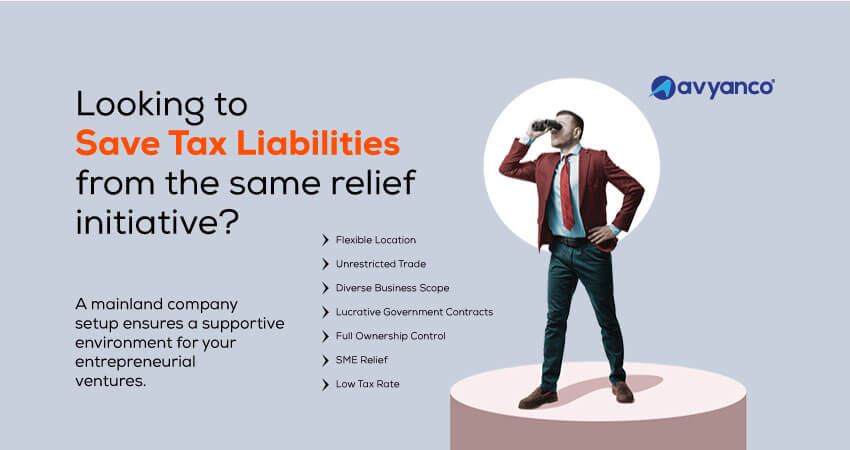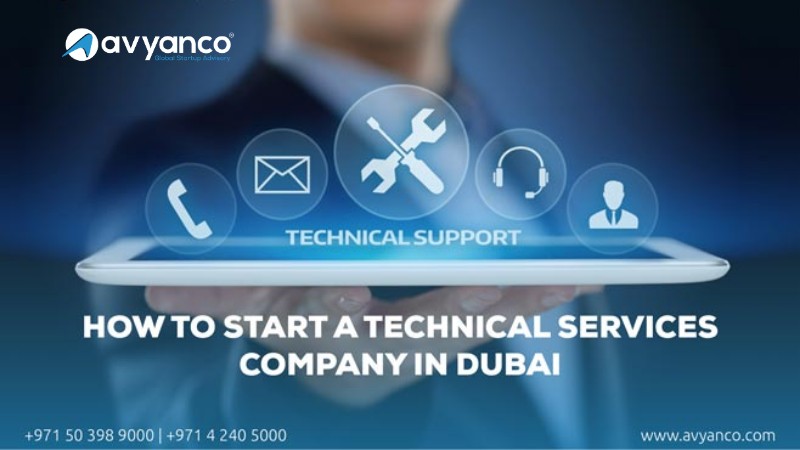In June 2023, a new corporate tax system was rolled out in the UAE. It focuses on mainland companies hitting sure annual profits. This blog will help you understand the benefits of forming a mainland company post-tax change. We will also discuss free zone companies and guide you through tax calculations. We’ve got your back if you’re a medium or large enterprise. Let us move ahead!
Background and Landscape of the UAE Corporate Tax
The United Arab Emirates (UAE) has been a tax-free haven for businesses for a long time. However, this changed in 2018 with the introduction of a value-added tax (VAT). In 2023, the UAE government further shook up the tax landscape. They introduced a corporate tax for Mainland and Freezone companies.
Corporate Tax Before 2018
Before 2018, the UAE did not have a corporate tax. This made it a desirable destination for businesses, as they could operate tax-free. However, the government began to see a decline in oil revenues. So it decided to introduce a VAT in 2018. The VAT rate was set at 5%, and it applied to all businesses in the UAE, including those in free zones.
Introduction Of VAT In 2018
The introduction of VAT was a significant change in the UAE tax landscape. However, it was not the only change that was made in 2018. The government also announced a corporate tax for mainland and free zone companies in the future. This decision was made to align the UAE with international tax standards.
Introduction Of Corporate Tax For Mainland Companies
A mainland company formation in Dubai is an onshore setup; the emirate’s Department of Economic Development has licensed it. They offer perks like no minimum capital and flexible opportunities. The corporate tax for mainland companies was introduced in June 2023.
The tax rate is set at 9%, which applies to all mainland companies with a taxable profit of more than AED 375,000. However, not all companies have to adhere to this policy. There are many exemptions from the corporate tax. These mainly include small businesses, free zone companies, and government entities.
Exemptions From Corporate Tax
There are several exemptions from corporate tax in the UAE. These include:
- Small businesses with an annual turnover of less than AED 375,000
- Free zone companies
- Government entities
- Non-profit organizations
- Charitable organizations
- Educational institutions
- Medical institutions
The corporate tax landscape in the UAE is still evolving. However, the newly established corporate tax for mainland companies will significantly impact businesses.
An Introduction To Mainland Companies
Mainland companies are the top players of businesses that operate on the mainland. They get their license from the Department of Economic Development in the emirate, where they start their operations. They come with many perks and don’t require a minimum capital to set up.
In addition, they’re like a bridge connecting you to endless business opportunities. These chances don’t just exist within the UAE but also beyond those sandy shores. The government is more lenient with them, which leads to smoother interactions between both parties.
Corporate Tax Compliance For Mainland Companies
Navigating Corporate Tax (CT) rules can seem like a puzzle. For mainland companies, the path is filled with benefits following the implementation of corporate tax. They can also capitalize on the SME relief available exclusively for mainland licenses.
Benefits Of Forming A Mainland Company In Dubai After Corporate Tax Introduction
The implementation of corporate tax in Dubai changed the business landscape. Despite the introduction of taxation, forming a mainland company in Dubai offers advantages:
a. Strategic Location
Dubai’s right where the action is, connecting the Middle East, Africa, Europe, and Asia. Your business will have better access to international trade. This will enhance your supply chain and boost your global business game.
b. Business Infrastructure
Dubai’s infrastructure boasts futuristic transport and super-advanced communication networks. This ensures that your operations run smoother than a freshly paved highway.
c. Diversified Economy
Dubai’s economy has thriving tourism, real estate, finance, tech, and more sectors. It’s like having multiple safety nets. If one industry takes a hit, you’ve got others to keep your business ship steady.
d. Access To Skilled Workforce
Your workplace can have people from different backgrounds, languages, and perspectives. It’s like a talent buffet where you can pick and choose the skills you need.
e. Free Trade Zones
Dubai has these impressive places called free trade zones. Taxes are minimal, foreign ownership is easy, and rules are streamlined for convenience. These zones are your golden ticket if your business is all about international trade.
SME Relief For Mainland Licenses
One of the notable developments after the corporate tax introduction is SME relief. It is exclusively available for mainland licenses. This relief supports small and medium-sized enterprises (SMEs) and fosters growth.
a. Reduced Licensing Costs
SMEs obtaining a mainland license may benefit from reduced licensing fees and costs. This financial relief aims to ease the burden on smaller businesses. It also aims to incentivize their establishment in Dubai.
b. Flexible Visa Allocations
SMEs are granted more flexibility in obtaining employee visas. So they can bring in skilled workers and talents essential for business operations.
c. Access To Funding and Grants
In Dubai, there are many opportunities for small and medium-sized enterprises (SMEs) to get funding. The government and various financial institutions release funding options exclusively for SMEs.
d. Business Support Services
SMEs based in the mainland of Dubai have access to business support services the government offers. These services encompass everything from mentorship to exciting networking events.
Understanding Corporate Tax Concerning Free Zone Companies
Let us discuss Corporate Tax (CT) regarding Free Zone companies in Dubai. CT is like businesses paying from their earnings to the government. When we say “Free Zone companies,” we mean businesses that work in special areas with benefits.
Here are some perks Free Zone companies usually get:
- Free zone companies must pay the corporate tax of 9% on incomes greater than AED 375,000. But they’re exempted from paying the tax if they engage in specific eligible activities and transactions, such as services like funds, wealth, and investment management, manufacturing and processing goods, reinsurance, holding securities, and ship ownership, management, and operation.
- They can bring things in and send them out without paying extra money to bring goods across borders.
- In some free zones, even people from other countries can own the whole company. In other places, they might need to share ownership with local people.
- Free zones have simple and clear rules, making it easier for companies to start and run their businesses.
Corporate Tax Calculations for Mainland Companies:
Let us discuss corporate tax calculations for mainland companies in Dubai. It is characterized by three key pieces known as thresholds. These thresholds are like checkpoints your business needs to cross before tax calculation.
1. Revenue Threshold
This is like the starting line of the tax calculation race. Before anything else, your business needs to hit a certain level of revenue. Once you cross this threshold, tax calculation will begin.
2. Profit Threshold
After hitting a good revenue, look at your profits. It’s not just about how much money you bring in – it’s about how much you’re making after covering all your expenses. You’re inching towards the final tax calculation when your profits cross this threshold.
3. Taxable Spending Threshold
Your business might be doing well in terms of revenue and profits. However, you also need to consider how much you’re spending on certain things. Once your spending hits this threshold, you’ve almost completed your tax calculation journey.
Your mainland company should hit three checkpoints – revenue, profit, and taxable spending. As your business grows, your tax contributions need to reflect that growth.
Example Of Tax Calculation
Imagine you’re running a Mainland company in Dubai that sells artisanal coffee beans. This is how the tax calculation game might play out:
Step 1: Revenue Threshold
Say your company’s total revenue for the year is AED 1,000,000. This is your starting point. You’ve hit the revenue threshold, which means you’ve qualified for the tax calculation race.
Step 2: Profit Threshold
Now, let’s consider your profits. After deducting all your expenses – like the cost of beans, packaging, and employee salaries – you’ve got a profit of AED 300,000. This means you’ve not crossed not only the revenue threshold but also the profit threshold.
Step 3: Taxable Spending Threshold
Next up, let’s look at your taxable spending. You’ve invested AED 150,000 to improve your coffee-roasting equipment and set up a cozy café corner in your shop. These expenses are considered taxable spending. With this spending, you’ve also hit the taxable spending threshold.
Final Lap: Tax Calculation
Since you’ve successfully crossed all three thresholds, your corporate tax calculation is triggered. However, the tax rate might vary depending on how well you’ve hit these thresholds. Let’s assume the tax rate is 15%.
Tax Calculation:
15% of AED 300,000 (your profit) = AED 45,000
15% of AED 150,000 (your taxable spending) = AED 22,500
Total Tax Payable: AED 45,000 + AED 22,500 = AED 67,500
Exemptions From Corporate Tax
Not all expenses have to join the corporate tax calculation party. Here are some common expenses that often get the exemption treatment:
1. Employee Salaries And Benefits
The money paid to hardworking employees in salaries and benefits is usually exempted. The government understands that keeping your team happy is essential for a thriving business.
2. Investments In Innovation
These expenses are often exempt if you’re putting money into research or innovative projects. The government encourages companies to push the boundaries and be creative.
3. Necessary Business Expenses
Expenses for core business activities, like buying raw materials for production, are exempted. After all, you need these things to keep your business running smoothly.
4. Charitable Contributions
If your company contributes to charitable causes, these expenses might catch an exemption. It’s like a reward for giving back to the community.
5. Education And Training
Those expenses could be exempted when you invest in your team’s education and skills. The government wants to promote growth not just in your business but in the skills of your workforce too.
Corporate Tax Filing Process For Mainland Companies
Let us explore the steps in filing corporate taxes for Mainland companies in Dubai. Unlike common perception, it is not complicated. The process ensures that your business stays on the right side of the tax rules.
Step 1: Gather Your Financial Data
You’ll need to gather all your financial information for the year to get started. This includes your revenue, expenses, profits, and other financial details.
Step 2: Calculate Your Taxable Amount
Using the data you’ve gathered, calculate your taxable amount. This is the portion of your profits that’s subject to corporate taxation. This is where those three thresholds we talked about earlier come into play.
Step 3: Apply the Tax Rate
Apply the applicable tax rate once you’ve figured out your taxable amount. This rate might vary based on the specifics of your business and the tax regulations in place.
Step 4: Fill Out The Tax Return Form
Now comes the paperwork part. You’ll need to fill out the tax return form provided by the tax authority. This form will ask for all the relevant financial information and calculations you’ve done.
Step 5: Double-Check And Review
Before you submit your tax return, it’s crucial to double-check all the numbers and details. Making sure everything is accurate helps prevent any potential issues down the road.
Step 6: Submit The Tax Return
With your tax return form all filled out and reviewed, it’s time to submit it to the tax authority. This is often done online through their designated portal or platform.
Step 7: Payment Of Taxes
Pay the amount within the specified timeframe if you owe taxes based on your calculations.
Step 8: Keep Records
After you’ve filed and paid your taxes, keep copies of all the documents, calculations, and records related to the tax filing. This is important for reference in case of audits or future inquiries.
Corporate Tax Registration For Mainland Companies
CT registration isn’t just a legal obligation. It is a strategic thrust that Mainland companies are making. By becoming tax-compliant, they’re positioning themselves strategically in a dynamic business environment.
Surpassing The GCC Competition
Regarding the Gulf Cooperation Council (GCC) region, UAE Mainland companies enjoy a distinct upper hand. The UAE’s tax rates are notably lower than many neighboring countries. This puts UAE-based businesses in the spotlight. They attract investors, entrepreneurs, and customers who want a more favorable fiscal landscape.
Shining On The International Stage
But wait, there’s more! The competition isn’t limited to regional borders; it’s a global race. Thanks to the UAE’s lower tax rates, Mainland companies can offer competitive prices while maintaining healthy profit margins. This positions them well to compete internationally, challenging companies worldwide.
Harnessing Tax Advantages For Growth
By embracing CT registration, Mainland companies can expect growth. This might involve expanding their footprint, investing in cutting-edge innovation, and enhancing their products, among many others. In essence, reduced tax burdens translate into increased financial resources.
A Solid Foundation Of Trust
Moreover, CT registration leads to transparent and responsible business practices. This bolsters the reputation of Mainland companies, both in their local markets and on the global stage.
Conclusion
To sum up, Avyanco advises being ready ahead of time to follow the rules. They have experts to help companies with Corporate Tax (CT) and offer guidance. Just reach out to Avyanco’s Corporate Tax specialists for reliable CT support. Avyanco is here to make tax matters easier and assist you every step of the way.









